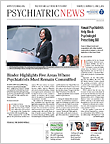Two coordinated genomewide association studies including more than 13,000 U.S. Army soldiers have found only elusive genetic associations with posttraumatic stress disorder (PTSD).
The studies were part of the Army STARRS collaboration, a multi-year, multimillion-dollar effort designed “to improve understanding of suicide and PTSD and related mental health risk and resilience in the U.S. Army.”
Genetic studies of people with PTSD are valuable because only a small minority of individuals exposed to trauma develop the disorder. While the difference between those who do and do not develop PTSD could be due to social factors or preexisting risk factors, several twin studies have shown that genetic variation contributes to risk for PTSD symptoms.
For the current study, Murray Stein, M.D., M.P.H., a professor of psychiatry, family medicine, and public health at the University of California, San Diego, and colleagues analyzed DNA from two study groups within STARRS: The New Soldier Study (NSS) compared 3,167 patients with PTSD with 4,607 trauma-exposed control individuals; the Pre/Post Deployment Study (PPDS) compared 947 patients with PTSD with 4,969 trauma-exposed controls.
In the NSS group, a single-nucleotide polymorphism (SNP) on chromosome 19 was associated with PTSD in European Americans. A SNP on chromosome 5 was also associated with PTSD among African Americans. Neither of these associations were seen in the PPDS sample.
Within the African-American sample in the NSS, however, the authors observed genomewide significant association with PTSD for SNPs in anankyrin repeat domain 55 (ANKRD55) gene on chromosome 5. Why this association is limited to African Americans is not clear.
“[Controlling] for population stratification increases the likelihood of finding genetic variation that is not spuriously associated with ancestry markers and increases the chances of finding differences that are marked by variation in one group and not another,” explained Kerry Ressler, M.D., Ph.D., a professor of psychiatry and chief scientific officer at McLean Hospital in Belmont, Mass., in an accompanying editorial.
The function of ANKRD55 is not known but has been reported to be associated with certain autoimmune and inflammatory disorders, like multiple sclerosis, type 2 diabetes mellitus, celiac disease, and rheumatoid arthritis.
The authors also reported significant pleiotropy was observed for PTSD and rheumatoid arthritis and psoriasis in the European American samples.
“Intriguingly, all of these immune-related disorders have been associated, to different extents, with environmental and psychological stress exposure,” commented Ressler.
“This set of findings adds to the literature the idea that although a number of different genetic and trauma-related mechanisms intersect to create increased risk for PTSD, some of these mechanisms may directly involve inflammatory responses,” Ressler continued. “In fact, inflammation as a mediator—or a result—of dysregulated stress responses, in part via dysregulated hypothalamic-pituitary-adrenal regulation, is increasingly being appreciated as an important component of a variety of stress-related syndromes, including depression and PTSD.”
Stein and colleagues noted that while the association of ANKRD55 with PTSD in African American participants was “small in magnitude,” the findings may help to elucidate “the nature of PTSD and its association with other illnesses.”
The authors concluded, “The finding of pleiotropy between PTSD and rheumatoid arthritis and psoriasis should further motivate the study of immune-related factors in PTSD, their potential contribution to comorbidity with inflammatory disorders, and a possible role for anti-inflammatory treatments in PTSD.”
The findings appeared online May 11 in JAMA Psychiatry. The study was sponsored by the Department of the Army and supported by the Department of Health and Human Services, National Institutes of Health, and National Institute of Mental Health. ■
“Genomewide Association Studies of Posttraumatic Stress Disorder in 2 Cohorts of US Army Soldiers” can be accessed
here. The related editorial, “The Intersection of Environment and the Genome in Posttraumatic Stress Disorder,” is available
here.

